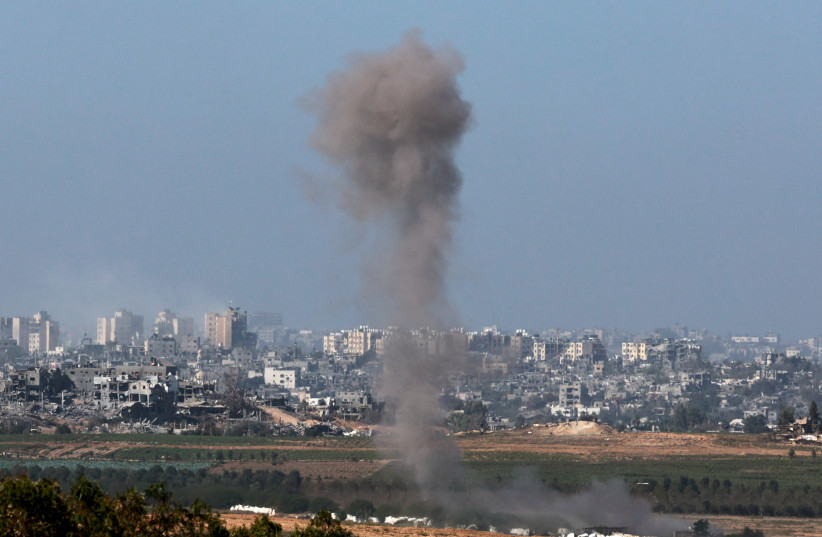Most of the media in the Arab world is hostile toward Israel. A slew of condemnations, some with undeniably antisemitic overtones, have been flooding the print, electronic, and social media since October 7. Most ignore the Hamas killing and captivity of women, children, and elderly Israelis. Those who do admit that Hamas perpetrated atrocities, justify them by citing Israel’s occupation of the West Bank, its prolonged siege of Gaza, and its soldiers’ alleged deliberate killing of Palestinians.
Qatar’s widely popular Al Jazeera media outlet is a leading propagator of this vitriol, mobilized to spread lies in the service of Hamas. Hostile coverage and commentary are also prominent in countries that have signed peace agreements with Israel, such as Egypt and Jordan.
But there are other voices, too. Although these are drowned out by the predominantly negative media coverage, they must not be ignored because they point readers and listeners to the Hamas savagery and the damage it inflicts on the Palestinian cause. Clearly, the media campaign is no less important than the military campaign.
Is the Arab world condemning Hamas?
Harsh criticism of Hamas is particularly noticeable in the Gulf, especially in Saudi Arabia. Unlike Qatar’s Al Jazeera, Saudi competitor Al-Arabiya has clearly adopted a more moderate stance in its coverage of the war. Thus, for example, in an interview with former Hamas head, and still a leading figure, Khaled Mashaal, the channel’s anchor Rasha Nabil criticized him for harming Israeli civilians and asked him if he would apologize for these acts.

Most of the articles critical of Hamas have been published in the London-based Saudi newspaper Asharq al-Awsat, considered one of the most influential Arabic-language newspapers. Particularly unusual and courageous, was an article by its former editor, Tariq Al-Homayed, who directly attacked the Hamas leader in Gaza Yahya Sinwar, urging him to demonstrate leadership and leave Gaza to prevent further bloodshed – just as Arafat left Beirut in 1982 – because he had turned life into hell for the enclave’s residents.
Newspapers published in Saudi Arabia carried similar columns, arguing that atrocities against innocent civilians on both sides cannot be considered a victory and accusing Hamas of handing a gift to the enemies of Islam by committing barbaric acts in the name of Allah. Pundits further argued that the Hamas operation was ineffective in terms of achieving the Palestinian goal of ending the occupation, making the Palestinian people its greatest losers. Hamas, some writers claimed, gave Israel the sword with which to take down the organization, while Iran was exploiting the Palestinian problem to the very last drop of Palestinian and Gazan blood.
OTHER COLUMNISTS and editorials accused Hamas of carrying out Iran’s agenda that seeks to undermine Israel’s normalization with the Arab world, rather than helping advance the goal of a return to the ‘67 borders and establishment of two states – Israel and Palestine. Peace should be the choice of the future, they opined.
Saudi, Kuwaiti, Moroccan, and other Arabic-language writers have also propounded these views on social media, arguing that the abuse of civilians, especially women and children, violates the tenets of Islam and the Prophet’s teachings, as they appear in the Quran.
In Egypt, key institutions such as Al-Azhar University and most of the establishment newspapers, are rife with anti-Israel venom and praise for Hamas. Al-Azhar issued a very harsh statement saying that “the Zionist enemy has turned into a rabid wolf, obsessed with the passion of killing children, women, and innocent people, and taking pleasure in eating their flesh and drinking their blood.” Some journalists described the Hamas attack as the “Second October Victory”, a clear reference to Egypt’s October 1973 victory over Israel.
But in Egypt, too, other voices can be heard. For example, Egyptian journalist Ibrahim Eissa lambasted Hamas for prioritizing its own interests, building tunnels for its weapons and members rather than shelters for Gaza’s residents. He described the Hamas attack on Israel as “irresponsible” and its cruelty to Israeli civilians as an “act of terrorism”. He also condemned what he called the Hamas culture of death, which detracts from efforts to address the Palestinian problem. Others in Egyptian media accused Hamas of blatant terrorism and described its perpetrators as “thugs” and “savages”.
The Lebanese media also brought to light some interesting reactions. Although usually hostile to Israel, the media in Lebanon is now expressing concern over Hezbollah’s further involvement in the Israel-Hamas war and warning against its expected destructive consequences for Lebanon. This concern has prompted unequivocal statements, mainly from Christians, calling on Hezbollah to avoid embroiling Lebanon in the war.
While most columnists have avoided condemnation of Hamas, one writer said he was in favor of the Palestinian cause but against Hamas. Another opinion by a Lebanese commentator associated with Hezbollah, recently called on Mashaal to come and fight himself instead of sending others [i.e., Hezbollah] to do the work.
It is difficult to assess at this stage the impact of these voices in the vast array of Arab media. However, the very rejection of the Hamas narrative by some in the Arab world is of great importance, as it shows that many are not oblivious to Hamas’s atrocities. As more credible information emerges about the Hamas atrocities, these voices may be amplified. Conversely, a severe humanitarian crisis in Gaza may strengthen the vitriolic attacks against Israel.
Prof. Elie Podeh is a member of Mitvim Insitutute’s Board of Directors and a lecturer in the Department of Islamic and Middle Eastern Studies at the Hebrew University. Dr. Elad Giladi lectures in the Department of Middle Eastern and Islamic Studies at the University of Haifa.
